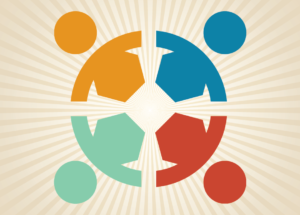Community of Conscience: The Inauguration of a New Progressive Partnership

As we celebrate the birthday of Rev. Dr. Martin Luther King, Jr., and we hope for a peaceful transfer of power this week, we also celebrate the inauguration of something else: a committed public relationship between secular humanists and people of faith. This newly developing partnership for progress isn’t based on agreement about the truth of religious beliefs, but is founded on shared ethical values: racial and economic justice, the preservation of our fragile planet from devastation by climate change, gender equality, the civil and human rights of LGBTQ+ persons, the right of women (not the government) to make decisions about their own reproductive health care, and religious liberty guaranteed by the First Amendment.
While both nonreligious and religious progressives historically worked side-by-side to address many of these issues and concerns, until now there has been no conscious commitment to and clear recognition of each other as mutually supportive participants in a more intentionally inclusive community of conscience.
This new shared self-understanding began to take shape for many reasons, but especially as individuals and activists from both groups worked side-by-side in the Biden-Harris campaign. There, with the strong encouragement of faith engagement director Josh Dickson, our groups jointly claimed our common responsibility to help “heal the soul of America.” Working together provided us with the opportunity to see each other as necessary partners in the effort to promote the progressive vision put forward by the Biden-Harris team.
In the context of the campaign, and in our desire to hold candidates accountable when they assume office, religious and nonreligious progressives acquired a better way of understanding and relating to each other with greater mutual respect and by expanding our frame of reference to use more inclusive language when talking to and about one another.
Due to its promise and commitment to bring diverse people together in the midst of a divided America, the Biden-Harris campaign gave many different communities and groups, including secular humanists and people of faith, an opportunity to unite in shared purpose and together seek common goals. But this coming together is also part of a larger trend of more and more people of conscience and good will finding new ways to work together despite differences in belief systems. Thus, with the birth of ecumenism, Christians found common cause across denominational lines. Later, Jews and Christians entered into constructive dialogue and practical cooperation, to be followed by Muslims, with all three traditions stressing their common Abrahamic origins. More recently, other religions joined in the conversations about tolerance, diversity, and shared action, and interfaith cooperation gained traction. Now, with secular humanists and diverse people of faith working with each other in partnership, we can recognize the even broader community of the ethically oriented community of conscience.
Regardless of one’s understanding of the world (how it got here and what it means), all members of this broader progressive partnership understand that we face pressing problems that span our positions on religious and philosophical questions. Expanding knowledge of each other, our shared world, and our universe present opportunities for new visions of justice and peace that can be fully realized only by overcoming the barriers between us.
Desiring this shared future, we should and will strive together for a just, meaningful, and peaceful world where human rights and humanitarian values become widely accepted as the basis for a world community that is affirming and inclusive, sensitive to environmental concerns, committed to greater equity for all people, and respectful of diversity in all its forms.
It’s past time for religious and nonreligious progressives to join together to bring our common resources and energies to bear on these crucial matters. Thus, whether we have a religious faith in the goodness of a deity or a nonreligious confidence in the possibilities of human goodness, we intend to continue to work more closely together to build the Beloved Community envisioned by Dr. King. In this way, we can and will do our part to make sure that the long arc of the universe bends a little more in the direction of justice for all.
